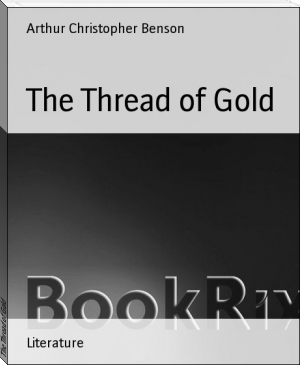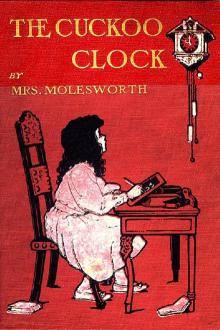The Thread of Gold, Arthur Christopher Benson [free ebook reader for pc .TXT] 📗

- Author: Arthur Christopher Benson
Book online «The Thread of Gold, Arthur Christopher Benson [free ebook reader for pc .TXT] 📗». Author Arthur Christopher Benson
We sat long in the panelled room, till it seemed all alive with soft dreams and radiant shapes, that floated in a golden air. All that was dark and difficult seemed cast out and exercised. But it was all so sincere and contented a peace that the darker and more sombre shadows had no jealous awakening; for the two were living to each other, not in a selfish seclusion, but as though they gave of their joy in handfuls to the whole world. The raptures of lovers sometimes take them back so far into a kind of unashamed childishness that the spectacle rouses the contempt and even the indignation of world-worn and cynical people. But here it never deviated from dignity and seemliness; it only seemed new and true, and the best gift of God. These two spirits seemed, with hands intertwined, to have ascended gladly into the mountain, and to have seen a transfiguration of life: which left them not in a blissful eminence of isolation, but rather, as it were, beckoning others upwards, and saying that the road was indeed easy and plain. And so the sweet hour passed, and left a fragrance behind it; whatever might befall, they had tasted of the holy wine of joy; they had blessed the cup, and bidden us too to set our lips to it.
XV
A Strange Gathering
I was walking one summer day in the pleasant hilly country near my home. There is a road which I often traverse, partly because it is a very lonely one, partly because it leads out on a high brow or shoulder of the uplands, and commands a wide view of the plain. Moreover, the road is so deeply sunken between steep banks, overgrown with hazels, that one is hardly aware how much one climbs, and the wide clear view at the top always breaks upon the eye with a certain shock of agreeable surprise. A little before the top of the hill a road turns off, leading into a long disused quarry, surrounded by miniature cliffs, full of grassy mounds and broken ground, overgrown with thickets and floored with rough turf. It is a very enchanting place in spring, and indeed at all times of the year; many flowers grow there, and the birds sing securely among the bushes. I have always imagined that the Red Deeps, in The Mill on the Floss, was just such a place, and the scenes described as taking place there have always enacted themselves for me in the quarry. I have always had a fancy too that if there are any fairies hereabouts, which I very much doubt, for I fear that the new villas which begin to be sprinkled about the countryside have scared them all away, they would be found here. I visited the place one moonlight night, and I am sure that the whole dingle was full of a bright alert life which mocked my clumsy eyes and ears. If I could have stolen upon the place unawares, I felt that I might have seen strange businesses go forward, and tiny revels held.
That afternoon, as I drew near, I was displeased to see that my little retreat was being profaned by company. Some brakes were drawn up in the road, and I heard loud voices raised in untuneful mirth. As I came nearer I was much bewildered to divine who the visitors were. They seemed on the point of departing; two of the brakes were full, and into another some men were clambering. As I came close to them I was still more puzzled. The majority of the party were dressed all alike, in rough brown clothes, with soft black felt hats; but in each of the brakes that were tenanted sat a man as well, with a braided cap, in a sort of uniform. Most of the other men were old or elderly; some had white beards or whiskers, almost all were grizzled. They were talking, too, in an odd, inconsequent, chirping kind of way, not listening to each other; and moreover they were strangely adorned. Some had their hats stuck full of flowers, others were wreathed with leaves. A few had chains of daisies round their necks. They seemed as merry and as obedient as children. Inside the gate, in the centre of the quarry, was a still stranger scene. Here was a ring of elderly and aged men, their hats wreathed with garlands, hand-in-hand, executing a slow and solemn dance in a circle. One, who seemed the moving spirit, a small wiry man with a fresh-coloured face and a long chin-beard, was leaping high in the air, singing some rustic song, and dragging his less active companions round and round. The others all entered into the spirit of the dance. One very old and feeble man, with a smile on his face, was executing little clumsy hops, deeply intent on the performance. A few others stood round admiring the sport; a little apart was a tall grave man, talking loudly to himself, with flowers stuck all over him, who was spinning round and round in an ecstasy of delight. Becoming giddy, he took a few rapid steps to the left, but fell to the ground, where he lay laughing softly, and moving his hands in the air. Presently one of the officials said a word to the leader of the dance; the ring broke up, and the performers scattered, gathering up little bundles of leaves and flowers that lay all about in some confusion, and then trooping out to the brakes. The quarry was deserted. Several of the group waved their hands to me, uttering unintelligible words, and holding out flowers.
I was so much surprised at the odd scene that I asked one of the officials what it all meant. He said politely that it was a picnic party from the Pauper Lunatic Asylum at H----. The mystery was explained. I said: "They seem to be enjoying themselves." "Yes, indeed, sir," he said, "they are like children; they look forward to this all the year; there is no greater punishment than to deprive a man of his outing." He entered the last brake as he said these words, and the carriages moved off, a shrill and aged cheer rising from thin and piping voices on the air.
The whole thing did not strike me as grotesque, but as infinitely pathetic and even beautiful. Here were these old pitiful creatures, so deeply afflicted, condemned most of them to a lifelong seclusion, who were recalling and living over again their childish sports and delights. What dim memories of old spring days, before their sad disabilities had settled upon them, were working in those aged and feeble brains! What pleased me best was the obvious and light-hearted happiness of the whole party, a compensation for days of starved monotony. No party of school-children on a holiday could have been more thoughtlessly, more intently gay. Here was a desolate company, one would have thought, of life's failures, facing one of the saddest and least hopeful prospects that the world can afford; yet on this day at least they were full to the brim of irresponsible and complete happiness and delight, tasting an enjoyment, it seemed, more vivid than often falls to my own lot. In the presence of such happiness it seemed so useless, so unnecessary to ask why so heavy a burden was bound on their backs, because here at all events was a scene of the purest and most innocent rapture. I went on my way full of wonder and even of hope. I could not fathom the deep mystery of the failure, the suffering, the weakness that runs across the world like an ugly crack across the face of a fair building. But then how tenderly and wisely does the great Artificer lend consolation and healing, repairing and filling so far as he may, the sad fracture; he seems to know better than we can divine the things that belong to our peace; so that as I looked across the purple rolling plain, with all its wooded ridges, its rich pastures, the smoke going up from a hundred hamlets, a confidence, a quiet trust seemed to rise in my mind, filling me with a strange yearning to know what were the thoughts of the vast Mind that makes us and sustains us, mingled with a faith in some large and far-off issue that shall receive and enfold our little fretful spirits, as the sea receives the troubled leaping streams, to move in slow unison with the wide and secret tides.
XVI
The Cripple
I went to-day to see an old friend whom I had not met for ten years. Some time ago he had a bad fall which for a time crippled him, but from which it was hoped he would recover; but he must have received some obscure and deep-seated injury, because after improving for a time, he began to go backwards, and has now to a great extent lost the use of his limbs. He was formerly a very active man, both intellectually and physically. He had a prosperous business in the country town on the outskirts of which he lives. He was one of those tall spare men, black-haired and black-eyed, capable of bearing great fatigue, full to the brim of vitality. He was a great reader, fond of music and art; married to a no less cultivated and active wife, but childless. There never was a man who had a keener enjoyment of existence in all its aspects. It used to be a marvel to me to see at how many points a man could touch life, and the almost child-like zest which he threw into everything which he did.
On arriving at the house, a pleasant old-fashioned place with a big shady garden, I was shown into a large book-lined study, and there presently crept and tottered into the room, leaning on two sticks, a figure which I can only say in no respect recalled to me the recollection of my friend. He was bent and wasted, his hair was white; and there was that sunken look about the temples, that tracery of lines about the eyes that tells of constant suffering. But the voice was unaltered, full, resonant, and distinct as ever. He sat down and was silent for a moment. I think that the motion even from one room into another caused him great pain. Then he began to talk; first he told me of the accident, and his journeys in search of health. "But the comfort is," he added, "that the doctors have now decided that they can do no more for me, and I need leave home no more." He told me that he still went to his business every day--and I found that it was prospering greatly--and that though he could not drive, he could get out in a wheeled chair; he said nothing of his sufferings, and presently





Comments (0)